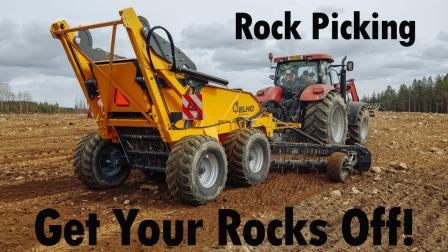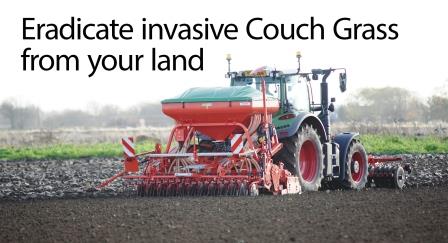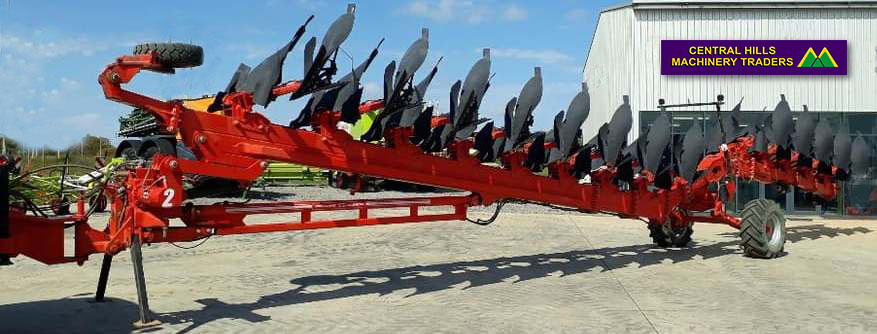Rock Picking
As land prices keep soaring, extra acres are expensive. It makes more sense to clear the rocky paddocks you already own, giving you more productive land.
Clear your land of rocks and leave the soil in the paddock where it belongs – giving you:

- rocky unproductive land turned into good, productive, arable soil
- better water retention
- less machine wear and tear
- better germination
- reduced costs for spare parts and machinery
- no overheads
Also ideal for clearing vineyards, picking up wood and clearing forestry.
“Tony is worth every cent in clearing my land of rocks. I don’t have to own (or store) the huge rock picker equipment he has, or pay for its upkeep – plus he does all the work”. – Jeff W
So, if you have unproductive rocky land, give Tony a call. Tony has spent 50 years in the agricultural machinery business so he knows his stuff. He owns an ELHO Hydraulic Rock Picker with a 6m rake. This substantial equipment will rake and pick in one pass. It is a high lift machine, able to dump into tip trucks. Tony can be contacted on 08 8391 1414 during business hours, or 0427 508 042 after hours.
Remove invasive Couch Grass
Not Ghost Busters….Couch Busters!
Eradicate invasive couch grass from your property, and enjoy seeing it harrowed, ploughed and sown – all in one pass. Tony Cross from Central Hills Machinery has spent 50 years in the agricultural machinery business, and 40 years’ experience eliminating couch grass using this technique with great success.

Benefits of using a Power Harrow:
- soil is finely broken up and evenly distributed, creating a perfect seed bed
- improves water filtration
- better germination and healthier plants
- helps the soil to breathe by allowing air movement and root aeration
- reduces disease by exposing fungi and bacteria to sunlight – essential for the health of the pasture
- no need for costly chemicals
“Tony ploughed my farm 15 years ago, which at the time was covered in weeds including couch grass. The pasture has lasted until now. I am getting him back to do again” – Cathy A, South Australia
A Power Harrow and Air Seeder will evenly distribute the seed to all parts of the paddock. This chokes and eradicates the couch grass, resulting in faster, better and thicker germination. If you use the normal drills and place the seed with a 6” or 7” spacing, it will only allow the weeds to grow in between.
If you don’t have a couch grass problem but your pasture needs some rejuvenating, Tony can rip out weeds or any old pasture, and then sow fresh seed – again, all in one pass.
Tony has a 5-metre Folding Power Harrow and Air Seeder, along with four Mould Board Ploughs ranging to 6 furrow, with steel and plastic boards for clay country.
Tony can be contacted on 08 8391 1414 during business hours, or 0427 508 042 after hours.
Deep Ripping
Rip & Roll
Most properties have hard pan soils that are 2 to 3 inches deep. A hard pan is a rock-hard layer of material close enough to the surface that limits the depth that plants can extend their roots. It also prevents internal drainage, so precious water becomes run off and is wasted.
Using his 3 metre Deep Ripper, Tony Cross at Central Hills Machinery can rip to around 2.5 feet and roll your pasture in one pass, giving you land that is far more productive.
Deep Ripping:
- unlocks hidden nutrients in the soil
- removes fertiliser lockup
- reduces/eliminates need for expensive chemicals
- ideal for sheep, horse and beef country that’s been trampled on for years
Deep ripping is of particular benefit when it is used to break through a compacted pan or distinct constraining layer, allowing root access to unconstrained soil water beneath this layer. It is most effective in deep sandy-textured soils where roots need to grow deep to access subsoil moisture.
So if you have hard-pan soils, give Tony a call. Tony has spent 50 years in the agricultural machinery business so he knows his stuff. He can be contacted on 08 8391 1414 or 0427 508 042 during business hours.
Mouldboard Ploughing
Mouldboard ploughing is a natural way of tilling the ground, and has been used for hundreds of years. It produces extremely good yield results, as opposed to discing, where the discs float over the ground, leaving an uneven surface and chopping the weeds, which generally then multiply.
We can reach around 15” to 16” depending on soil type. Generally 4” to 8 “ is a good depth for various types of sowing.
Machinery available:
- 5 furrow linkage hydraulic
- 8 furrow Kverneland reversible
- 13 furrow hydraulic reversible
The larger 13 furrow plough is 66’ long (it’s one of the largest ploughs in Australia), and can cover a vast amount of area in a short time, especially with the 8 furrow and the 13 furrow working in unison. It is a very cost effective method of working the soil correctly, with positive consistent depths for all crops particularly potatoes and onions. Both ploughs working together cover around 32’ in one pass. In order to pull these ploughs, Tony uses a 300+ horsepower Deutz and an 8-wheeler linkage versatile tractor for very heavy conditions.

.
The benefits of mouldboard ploughing include:
- Complete weed control without the use of pesticides. As the plough works the ground, it buries weeds that tend to spring up after harvest. The plough thoroughly inverts the soil which inhibits the growth of weeds until the following season. This spares you from the time and labour involved where weed resurgence is a frequent occurrence.
- Even depth of soil for planting. When well-adjusted, the plough automatically seeks the desired depth. The complex structure of the plough clears the ground of wheel tracks and channels left by the machinery used to harvest, which creates a more level surface, enabling seed to be sown with higher accuracy.
- Can incorporate non-wetting soils and bring clay to the surface (depending on depth).
- Removes compaction, resulting in increased productivity.
- Reduced soil water repellence
- An opportunity to increase soil pH through lime incorporation
- The plough helps get rid of many of the pests that dwell on farmland. When these pests are eradicated, it provides plants with a more conducive environment for healthy growth. Minimal presence of pests also contributes towards a greater yields.
- The plough buries crop residues deeper into the ground, which enables decomposition to take place. The reduction of crop residues on the soil surface enables the soil to warm up faster. Evaporation of water is also enhanced which provide a more conducive environment for seed when it is sowed.
- the plough also buries surface manure and fertilisers. This optimises availability of nutritional content to deeper levels within the soil. It also reduces the odour of manure and fertiliser when these occur abundantly on the surface soil.
- The plough activity reduces the loss of nitrogen through volatilisation. More nitrogen is made available for humus to be produced from organic content. Mineral formation is also facilitated through this process.
Tony Cross has over 44 years of ploughing experience. He helped instigate the concept of mouldboard ploughing in Western Australia in 2002, and has competed in the world ploughing competitions. Tony says that mouldboard ploughing has been largely forgotten in SA, with the perception that it ruins the soil and the ground can’t be ploughed shallow, however this is totally incorrect. Mouldboard ploughing is a must for heavy cropping ground to turn the soil over, as much of the ground has become chemical-resistant, and farmers have to use 2 or 3 times the rate of chemicals to get a sufficient weed kill.
One farmer in the Clare Valley has been ploughing his ground for cereal crops for over 25 years with amazing results, and has achieved around 12 inches of beautiful chocolate soil with an abundance of microbiological activity with minimal use of sprays.
We have just completed a job where the ground was completely covered with 3 corner jacks and melons. The farmer had been trying to rid his land of this for 6 years to no avail. We ploughed this ground early last year, and the crops are now growing exceptionally well, with virtually no 3 corner jacks and no melons.
For further information, contact Tony at Central Hills Machinery on 08 8391 1414 during business hours or 0427 508 042 after hours.
